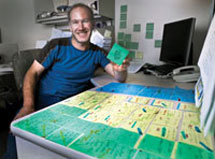

Monday - April 25, 2011
SLAC Today is
available online at:
http://today.slac.stanford.edu
In this issue:
SLAC Science Data Sticks
Colloquium Today: The Supply Chain of CO2 Emissions
 |
 |
|
Monday - April 25, 2011 |
SLAC Science Data Sticks (Photo by Brad Plummer.)
Even through the BaBar collaboration stopped taking data in 2008, it's still producing a steady flow of scientific results. To keep track of the roughly 35 papers the collaboration will publish in the next year, the high-tech experiment went low-tech this summer. It transferred data from computers to Post-it notes. BaBar physics analysis coordinator Steven Robertson uses the notes' vibrant colors to help him shepherd data analyses through the collaboration's rigorous approval process. The Post-its, he says, make it easier for him to see what he most urgently needs to work on when he arrives at SLAC National Accelerator Laboratory each morning. "What started as a set of simple reminders at some point developed into a formal system," Robertson said. He writes blue notes for papers in the first stage of the review process; yellow for analyses that have gone on to the next step, in which the entire collaboration reviews a draft of the completed paper; and green for papers submitted for publication in scientific journals. "It's gratifying to see that the collaboration is still churning out papers," Robertson said. "Ultimately every one of these Post-its should turn into a publication." BaBar scientists have published about 450 papers so far, and he expects to see another 100 in the pipeline. Colloquium Today:
|
Events
Access
AnnouncementsLab Announcements
Community Bulletin BoardTrainingLab Training
Upcoming Workshops & Classes
News |
|
| | ||
|
|
||
 <%
Response.AddHeader "Last-modified", getArticleDate()
'Response.AddHeader "Last-modified","Mon, 01 Sep 1997 01:03:33 GMT"
'Monday, December 06, 2010
%>
<%
Response.AddHeader "Last-modified", getArticleDate()
'Response.AddHeader "Last-modified","Mon, 01 Sep 1997 01:03:33 GMT"
'Monday, December 06, 2010
%>View online at http://today.slac.stanford.edu/. |
||